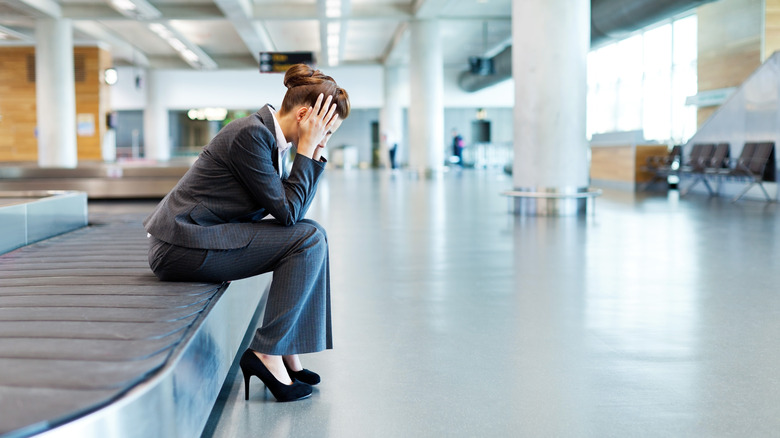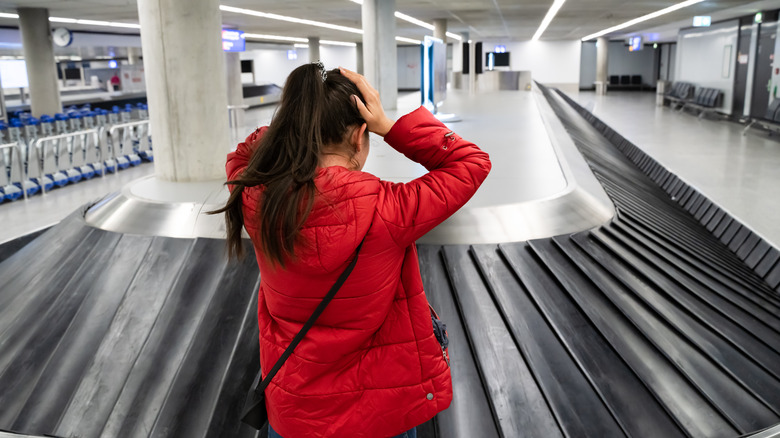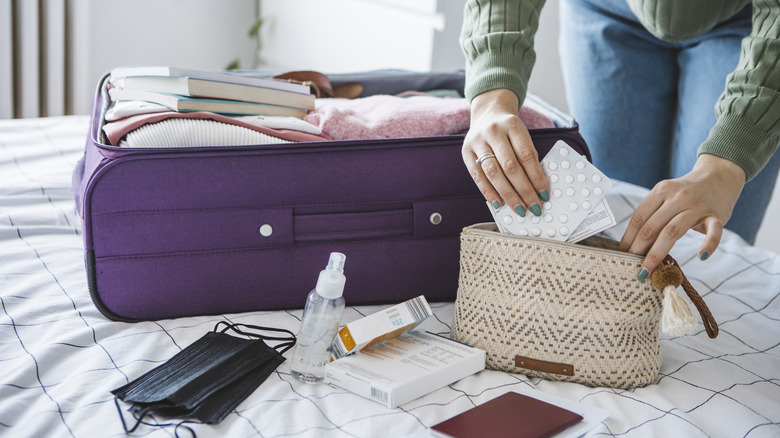When To Get The Law Involved Over Lost Luggage
You pack carefully for your trip, check your bag — you probably paid a large fee, something that didn't exist years ago — and you're finally off your flight. You head to the baggage carousel, and you wait. And wait some more, but unfortunately, your luggage is gone. It's every traveler's nightmare scenario.
Per a 2021 report, over 5% of baggage was bungled, to the displeasure of flyers. Of course, airlines are supposed to pay you for damaged and lost luggage, but in many cases, you have to go through quite a process to get anything done. When it can't be fixed, can you sue the airline?
While you can take a lost luggage case to the courts, you must accomplish a few things first. Here is our breakdown of what to do and when to take it to the next level. We'll also give you tips to prevent this from happening in the first place.
What to do before you sue
The U.S. Department of Transportation details what to do if your bags don't arrive at your destination. First, immediately notify the airline and have them file a report. Do not leave without a copy of the report — even if airline personnel say your bag will be on the next flight.
You also have to find out if they'll deliver the bag to you or if you have to pick it up upon discovery. You should get the phone number for this specifically. Some airlines will give you a stipend for the loss, but it may not be enough to replace things. They can also choose to reimburse you at a later date. Ensure you get detailed recompensation information and what it covers or if they'll fund any rentals you need.
If they cannot find the bag, you must file a claim or complete another form. For a multi-flight trip, the final carrier is usually responsible for reimbursement. But the airline can depreciate the cash value of your items, offer tickets for future flights, or outrightly deny the claim. Sometimes, you may have to wait a month or more for reimbursement. Be aware that different maximum amounts will be refunded domestically versus internationally. Don't forget to check with your credit card company or property insurance, which may cover some of your loss.
When to take it to the courts
When the airline has lost your luggage, and you aren't getting the response you're looking for after following the required procedures, it might be time to choose a legal avenue. The airline contract you agreed to when you bought the ticket (you know, the thing no one reads) may limit what you're entitled to. They may not cover spoiled food or fragile items.
Airlines will likely want to stay out of court, so you must file a Property Irregularity Report (PIR) to increase your likelihood of a settlement. If that doesn't work, file a claim in small claims court. That doesn't require an attorney, but each state has maximum limits regarding what you can recover.
If small claims court won't settle the damages, and you've checked to see what your credit card company and homeowner's or renter's insurance will cover, it may be time to get an aviation lawyer. If aviation law protects your losses, this type of attorney can help you negotiate a higher settlement or file a lawsuit. They will also inform you of the coverage and exclusions.
Luggage tips to know to prevent this in the first place
While you can't avoid the possibility of lost luggage completely, you can take a few steps to make it less likely and be prepared if it happens anyway. First, consider travel insurance. Your policy will likely cover baggage loss, delays, and some items you need to continue the trip without your suitcase. Check the guideline and remember that not everything will be covered.
Ensure you have a luggage tag with info like phone number, email, home city, and destination — first initials aren't the worst idea if you want to keep some information private. Take pictures of your luggage, including shots of the tag, you handling it, and even loading it onto the carousel. You can also put your contact information inside the bag. To be thorough, lay out your packed items on the bed, with the suitcase nearby, and take a picture so you know exactly what you're claiming.
Pack all valuables on your person or in a carry-on bag. This includes jewelry, medications, cameras, passport, IDs, tickets, hotel information, and anything that cannot be replaced. We also recommend packing a change of clothing, underwear, as well as toiletry items you'll need for the night. Finally, an AirTag isn't the worst idea. That bag may be nearby and didn't reach the carousel.



